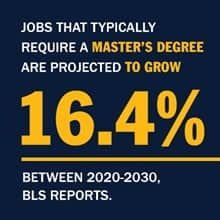Earning your bachelor's degree is an essential first step to becoming educated in your desired field, but you can take it further. Moving forward with a master's degree can help you gain a more specialized education and build a solid foundation for your career.
There are many types of master's degrees for you to explore when considering your options – like a Master of Science.
What Does MS Degree Stand For?
Your desired field of interest will determine the type of master's program you should enroll in. For example, a Master of Science (MS) focuses on technical and scientific areas while covering a wide array of skills and knowledge.

An MS degree is a graduate degree that contains different programs that fall under the science, technology, engineering and math (STEM) fields, as well as programs in business, social sciences and healthcare. Whether you want to work in accounting, cyber security or sports management, an MS degree can provide you with the knowledge and skills to problem solve, think critically and research while providing expertise in your field.
Some examples of MS degrees include:
A bachelor's degree is normally 4 years and 120 credits, but how long is a master's degree? Master's programs typically take anywhere between 1 to 2 years to complete and vary between 30-60 credits, depending on your program.
When deciding on your master's degree, look into all of the possible options within an MS degree or a Master of Arts (MA) degree, which are generally the two broadest types of master's programs. There are also more specialized programs such as a Master of Business Administration (MBA), a Master of Public Health (MPH), and a Master of Fine Arts (MFA). Be sure to do your research to ensure you are getting the best education for your career goals.
Which is Better, MA or MS?
There is no one master's program that is better than the other. It all depends on your field of study and the career you hope to advance in. The main difference between an MA and MS degree is while an MS degree focuses on more technical fields, like business and STEM, an MA degree focuses on the arts and humanities.
Your interest and goals will be the best indicator of what degree you should choose. For example, if your goal is to understand business better, you would want to pursue an MS in Business Analytics. It can give you a more technical and hands-on approach to analyzing data and creating clear-cut data visuals with industry-standard tools.
If your goal is to become a writer, you may want to consider an MA in English or an MA in Creative Writing, taking a more theoretical approach to creating the foundational skills needed to be successful.
While both an MA and an MS have their benefits, one will be better for you and your goals. No matter the program, getting your degree can expand your knowledge and broaden your career opportunities whether you intend on advancing in your current career or pivoting to a new one.
What Falls Under an MS Degree?

Some examples of popular programs and their job outlooks that fall under an MS degree:
- MS in Accounting: A master's in accounting can prepare you for a career as an accountant, auditor, fraud examiner and financial analyst. An accountant's role is to prepare and review financial records for individual corporations. The specialized skills learned in your MS degree may give you advanced knowledge to better do your job. According to BLS, the median annual wage for accountants and auditors was $73,560 in May 2020 with a projected 7% job growth from 2020 to 2030.
- MS in Criminal Justice: During your master's in criminal justice program, you can gain the necessary skills in ethical leadership, business management and more. Whether you want to work for the federal government, state and local government or continue to advance in your law enforcement job, an MS degree can help take you to the next step. Working in the criminal justice field is ever-changing and growing. Police and detective work is projected to grow 7% from 2020 through 2030, earning a median salary of $67,290 in 2020, according to BLS.
- MS in Human Resource Management: Human resource management is a vital role at any company. Obtaining your master's in human resource management can provide you with the soft skills needed in your field. The program is designed to help you learn creative problem-solving skills, management skills, decision-making skills and how to work from an empathic and ethical standpoint. In 2020 a human resource manager earned a median salary of $121,220, with 9% job growth projected through 2030, according to BLS.
- MS in Information Technology: The world of information technology is constantly evolving and is needed in every industry. A master's in information technology can prepare you to identify and implement technologies to provide competitive differentiators for organizations, making you more marketable in your career. The median earnings for people working in IT were $91,250 in 2020, with 13% job growth through 2030, according to BLS.
- MS in Psychology: Whether your career goal is to become a therapist, psychologist or professor, you can attain real-world perspectives during your master's in psychology. This degree can provide a deeper and more technical understanding of different forms of psychology, learning theories and ethical practices. In 2020 psychologists earned a median salary of $82,180, with 8% job growth through 2030, according to BLS.
A master's degree can provide you with a higher earning potential. According to BLS, the median weekly wage for full-time workers over the age of 25 whose highest education level was a master's degree was $1,545, compared to $1,305 for those holding only a bachelor's degree.
Is an MS Degree Right For Me?
An MS degree can provide you with a deeper and more focused education in the sciences than a bachelor’s degree would, can accelerate your career growth and provide you with a better foundation to begin moving forward in your future goals.
When considering going back to school or advancing towards a master’s degree there is a lot to consider. There's a lot to consider. You'll want to make sure it's the right time for you and that the degree offers the pacing you need.
Be sure to do your research by talking to an advisor, reviewing job descriptions, and researching different programs' curricula to find the right degree and program for you.
A degree can change your life. Find the SNHU master's program that can best help you meet your goals.
Alexa Gustavsen '21 is a writer at Southern New Hampshire University. Connect with her on LinkedIn.
"degree" - Google News
April 16, 2022 at 02:13AM
https://ift.tt/noJv1iq
What is an MS Degree | SNHU - Southern New Hampshire University
"degree" - Google News
https://ift.tt/tIY6MQs
https://ift.tt/bVMoQBn
Bagikan Berita Ini
















0 Response to "What is an MS Degree | SNHU - Southern New Hampshire University"
Post a Comment